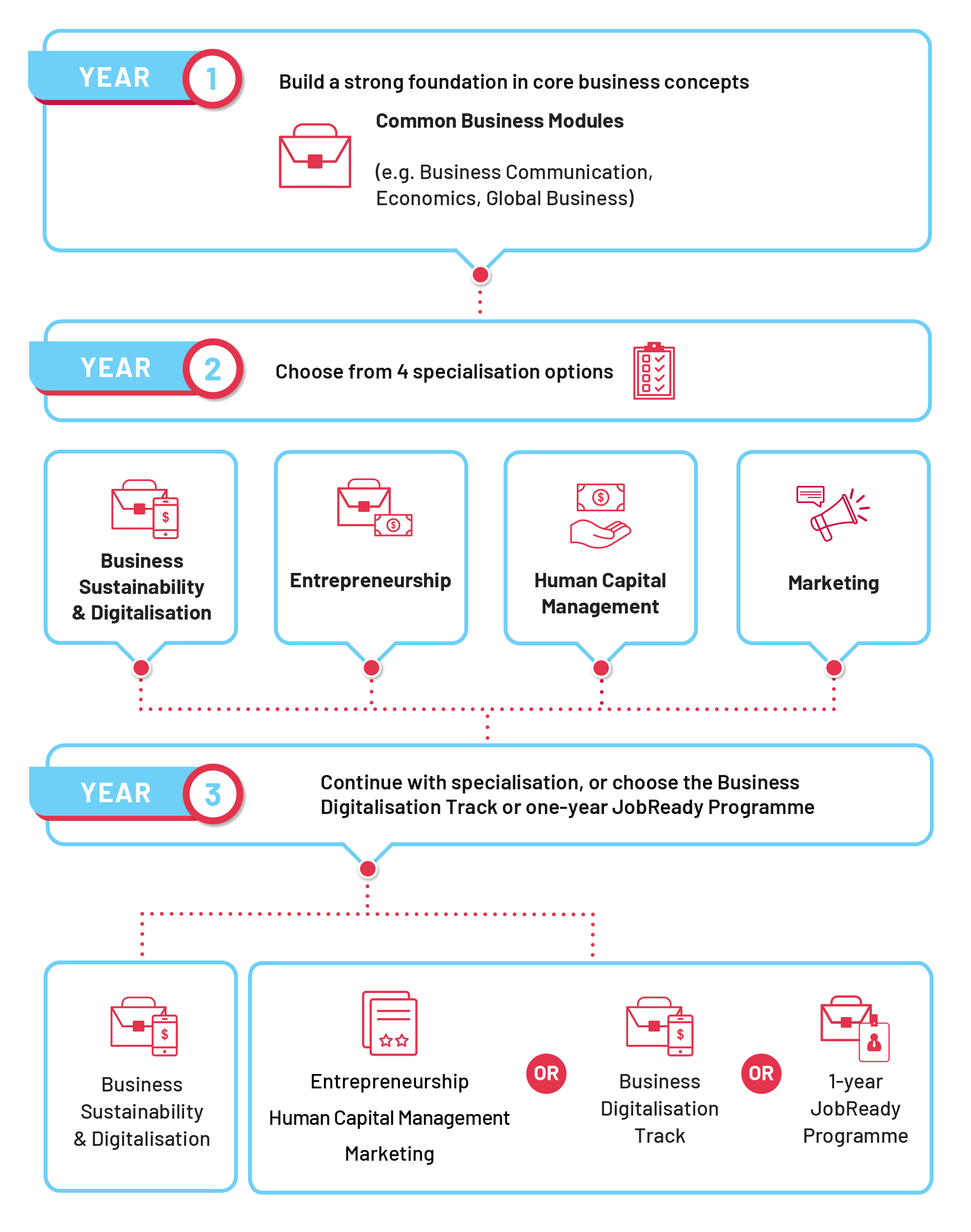Why BS?
- One diploma with multiple options
- Four in-demand specialisations to match your career goals: Business Sustainability & Digitalisation, Entrepreneurship, Human Capital Management and Marketing
- Future-proof yourself through the Business Digitalisation Track or get real-world exposure through a six-month local/overseas internship or one-year JobReady Programme
- Gain real-world learning through integrated and capstone projects sponsored by leading industry partners
About BS
Prepare for the ever-changing business landscape
with our highly versatile and sought-after Diploma in
Business Studies (BS)! With four specialisation options
to choose from, this premier business programme
sets you up for success as a business manager, HR
specialist, marketing expert, or entrepreneur!
Choose how and what you wish to learn. Start by building a strong foundation in business management before selecting one of four specialisations:
- Business Sustainability & Digitalisation
- Entrepreneurship
- Human Capital Management
- Marketing
As digital technologies evolve, you can further enhance
your skills through the Business Digitalisation Track.
Here, you will gain expertise in AI, robotics, advanced
business analytics, and digital commerce – all of which
will get you future-ready.
For hands-on business experience, choose between
a six-month local or overseas internship, or opt for
the one-year JobReady Programme to deepen your
industry exposure.
At BS, you will tackle real-world business challenges through integrated and capstone projects sponsored by partners such as Adecco, FoodXervices, Mediacorp, Saison Capital, and more.
Our strong partnerships with these industry leaders mean that the curriculum
is co-developed, co-delivered and co-assessed by experts, allowing you to gain valuable insights through projects, workshops and mentorship.
You will have the opportunity to develop omnichannel marketing strategies and test your ideas at Xplore Shop,
our on-campus lifestyle store. Collaborating with industry partners, you will manage inventories, run promotions, and discover how smart retail technologies enhance the shopping experience!
Overview of Your BS Journey

Highlights
Championing Sustainability
Business Studies student Jaymie Seah (left) started a sustainability project called XTRA Vintage, which encourages the reuse of clothing
through the sale of pre-loved donated clothes. As a participant of the Youth for Environmental Sustainability Leaders Programme by the National Environment Agency, Jaymie will receive funding support of up to $5,000 to implement her project.
New Business Sustainability & Digitalisation Track
Many organisations are catching the green vision, with leading global companies showing the way by adopting sustainable business practices. The BS course launched the Business Sustainability & Digitalisation track to prepare students to tap these opportunities. Embedded into the curriculum are the 3 pillars of sustainability - Economic, Environment and Social – and their applications with the Environment, Social and Governance (ESG) framework to create enterprise value.
Further Studies
The BS diploma is recognised by all local and many overseas universities, many of which offer module exemptions. Our graduates enjoy up to one year’s exemption at universities in Australia and the United Kingdom.
In partnership with the Institute for Human Resource Professionals (IHRP), BS students specialising in Human Capital Management will graduate as IHRP-certified associates, providing a structured pathway to becoming an IHRP-certified professional.
Careers
With a constant demand for business graduates in Singapore and the region, you will be highly sought-after by employers in various fields such as:
- Business Consulting
- Business Sustainability
- Corporate Communications
- Events Planning & Management
- Human Resource Management
- Learning & Development Management
- Marketing Communications
- Marketing Research
- Public Relations
- Sales & Marketing
- Service Operations & Management
Entry Requirements
AGGREGATE TYPE ELR2B2-B
To be eligible for consideration, candidates must have the following GCE ‘O’ Level examination (or equivalent) results.
| Subject | 'O' Level Grade |
|---|---|
| English Language | 1-6 |
| Additional Mathematics/Mathematics | 1-6 |
| Any one of the 2nd group of Relevant Subjects for the ELR2B2-B Aggregate Type | 1-6 |
Applicants must also fulfil the aggregate computation requirements for the ELR2B2-B Aggregate Type ( English Language, 2 relevant subjects and 2 other best subjects) listed at www.np.edu.sg/docs/ELR2B2.pdf .
For students with other qualifications, please refer to the NP website for the entry requirements and admissions exercise period.
What You Will Learn
Economics (3 Credit Units)
This module provides students with an understanding of the core principles of microeconomics and macroeconomics with an application of these concepts in real-world business scenarios. Topics include Demand and Supply, Price Elasticity, Market Structure, Gross Domestic Product, Unemployment, Inflation, Fiscal and Monetary policy.
Global Business (3 Credit Units)
This module provides students with fundamental knowledge of how the external business environment, consisting of country and industry level factors, affects the overall strategy, organisational structure and various internal functions of international businesses. Students will also discuss how contemporary world affairs, such as the impact of globalisation, terrorism, pandemics, emergence of economic powers in Asia and digitalisation present both opportunities and challenges to international businesses.
Makings of a Business (4 Credit Units)
Students will gain hands-on and real-world experience as they actively learn to integrate and apply knowledge and skills acquired in various modules to manage different types of businesses through game simulation. They will gain understanding of the inter-dependence of the different business functions, and to make data-driven decisions to address day-to-day operations of a business. They will also develop critical thinking and complex problem-solving skills as they analyse performance data and evaluate decisions to improve overall company performance.
Programming for Business (3 Credit Units)
This module provides students with fundamental programming concepts and best coding practices through the extensive use of in-class demonstrations and hands-on practices. Students will learn how technology functions by building digital solutions such as business applications and tasks automation by applying their programming skills. Students will learn how to problem solve through computational thinking.
Statistical Applications for Business (4 Credit Units)
This module introduces students to basic statistical concepts, tools and models. Students will learn how to organise and analyse data, as well as interpret results for decision-making in the business world. Students will apply and reinforce their learnings through data presentation and performing descriptive analysis on data generated from the Business Simulated Game.
Health & Wellness (1 Credit Unit)
This is a Level 1 Core module for all Year 1 students. The module will introduce students to the importance of maintaining both physical and mental health through the knowledge and monitoring of health indicators, and application through appropriate exercises. The aim of the module is to empower students with basic knowledge and skills to be independent and responsible in maintaining overall personal health.
Innovation Made Possible^ (3 Credit Units)
English Language Express* (Credit Units - NA)
English Language Express aims to give you a better grounding in the English Language and to strengthen the written and oral communications skills that you will need in your academic and professional careers. You will be engaged in writing, reading, listening and speaking activities that will develop your ability to speak and write grammatically, coherently and clearly. You will also hone your reading and listening comprehension skills.
* This module is only offered to students who are weaker in the English Language.
^ Critical Core modules account for 10 credit units of the diploma curriculum. They include modules in innovation and world issues, as well as an interdisciplinary project. By bringing students from diverse diplomas together, the interdisciplinary project fosters collaboration to explore and propose solutions for real-world problems. NP aims to develop students to be agile and self-directed learners, ready for the future workplace.
This module teaches students to effectively refine their written and spoken communication skills, discussion techniques, and people skills. Students will learn techniques to think on their feet to deliver an effective business pitch confidently. They will learn to persuasively communicate opportunities and ideas by creatively tailoring their business message for their target audience using storytelling techniques. Students will also develop their information literacy skills to craft clear business messages using APA style referencing.
Business Law (3 Credit Units)
This module provides students with an understanding of the basic knowledge of the law and its application in a business environment. Topics include the Singapore Legal System, Law of Contract, Law of Tort, Law of Agency/E-Commerce/Artificial Intelligence Law (E-Comm/AI Law), Law of Business Organisations, Introduction to Company Law and Intellectual Property Law. Students will also develop clarity of thought that requires a critical discerning eye and logical reasoning when applying legal principles to practical business decisions.
Kickstart a Business (4 Credit Units)
The module is designed for students to integrate and apply learning from the different modules to address real-world challenges provided by industry partners. Using the Lean methodology, students will build a Lean Canvas Model to develop and showcase a minimum viable product to address challenges and evaluate opportunities. They will learn about resource optimisation and value creation for businesses.
Finance & Accounting for Business (3 Credit Units)
The module imparts basic accounting and finance knowledge to students, in areas such as accounting equations, accounting principles, financial statements, ratio analysis, cash budgeting, short-term financing strategies, time value of money and capital investment analysis. Students will demonstrate their understanding by using financial software to interpret financial accounting information for decision-making in business environments when working on integrated project scenarios.
User-Centred Design for Business (3 Credit Units)
The module covers digital media design competencies with user-centered design principles. Students will learn to use design software and apply the design competencies on digital platforms such as web, mobile and desktop. Students will also learn to address digital design issues related to the user experience, presentation of the information, the imagery and the visualisation during their designing process.
Career & Professional Preparation (2 Credit Units)
This module supports students in their journey of self-discovery, character-building, NP values-inculcation, development of education and career goals via experiential activities and guided reflections with CPP coaches. To prepare them for their career and the future, students will also deepen their knowledge of the respective diploma curriculum and industries through learning journeys, mentorship and opportunities for interactions with alumni and industry practitioners. The module will incorporate a more comprehensive feedback and reflective approach from self, peers, tutors and the industry mentor to support students’ holistic growth and development.
Develop a Business (4 Credit Units)
This module is designed to let students learn how to create and validate business ideas, and subsequently start and grow a business/ venture. Students will learn how to apply the Blue Ocean Strategy to create value. Students will also learn to analyse and present their idea using the Business Model Canvas and carry out experiential activities based on their proposed business ideas.
Marketing in the Digital Age (4 Credit Units)
This module covers the fundamentals of marketing in the digital age. It allows students to explore how a marketer can use new and emerging technologies to create strategies to build business relationships effectively. The module aims to provide a holistic view of the entire marketing programme to reach out to the consumer at every touchpoint of their customer journey, both online and offline.
People & Culture (4 Credit Units)
This module empowers students to design inclusive cultures through the interdisciplinary blending of organisational psychology and human capital management principles. Students will adopt an applied approach through collaborative experiential opportunities with industry to enhance existing human capital practices, allowing positive employee experiences and well-being to thrive.
Service Management (3 Credit Units)
This module introduces students to the principles of service management and operations in service organisations. Key concepts covered include the nature of services, service encounter, service quality, process improvement and managing waiting lines. Quantitative models for service management are also covered to address forecasting, managing service inventory and service projects.
Sustainability Management in Business (3 Credit Units)
Students will learn the three key pillars of sustainability - economic, environmental and social in conjunction with the United Nations Sustainable Development Goals (SDGs) and how technology is harnessed to improve the efficiency of business processes and related activities in order to create sustainable value and reduce environmental impact. Service-learning is infused in this module to enhance education for sustainable development.
World Issues: A Singapore Perspective^ (2 Credit Units)
^ Critical Core modules account for 10 credit units of the diploma curriculum. They include modules in communication, innovation and world issues, as well as an interdisciplinary project. By bringing students from diverse diplomas together, the interdisciplinary project fosters collaboration to explore and propose solutions for real-world problems. NP aims to develop students to be agile and self-directed learners, ready for the future workplace.
COMMON MODULES
Business Analytics (4 Credit Units)
This module exposes students to the fundamental concepts of business analytics to develop effective analyses and reporting solutions. It explores the use of business and technical tools such as data warehousing, three-dimensional data modelling, aggregation, and pivoting. These tools support managers in the analysis of key business data in order to make good business decisions and design appropriate business strategies. Students will learn to organise data, develop spreadsheet models, design effective and user-friendly reports and automate data transformation and consolidate tasks.
Business Communication 2 (4 Credit Units)
This module builds on the foundation of Business Communication 1 and creates opportunities for students to strengthen their oral and written communication. Students will be required to enhance their presentation skills through impromptu speeches. Students will also learn how to prepare a business proposal. Job hunting and employment skills will be introduced to prepare students for a positive start to their careers. Students will be taught to write application letters and resumes. Additionally, students will learn job interview techniques through role-plays and simulations.
ENTREPRENEURSHIP SPECIALISATION
Business Models & Strategies (4 Credit Units)
This module teaches students how to apply the Business Model Canvas to design business value propositions. They will learn the process to build effective business models. Students will also be exposed to platform businesses, franchising and live streaming as possible business models for the global economy through experiential projects.
Innovation for Value Creation (4 Credit Units)
Students are guided to create value and innovate using appropriate tools and techniques systematically. This includes delivering value by leveraging current technology. Topics include understanding the nature and types of innovation, recognising, analysing, and implementing innovative ideas. Students will develop the decision-making skills required to create products or services of value.
Startup Finance (4 Credit Units)
Students will gain an understanding of the funding landscape in the startup ecosystem. Students will learn how to forecast sales, understand financial requirements, and know the various funding sources and stages that startups go through. They will hear from founders and venture capitalists about the challenges and expectations of fundraising and learn how to apply tools of valuation techniques.
HUMAN CAPITAL MANAGEMENT SPECIALISATION
Talent Experience & Engagement (4 Credit Units)
This module immerses students in the talent management cycle of talent sourcing, acquisition and engagement. Students will formulate value-driven human capital solutions through multi-disciplinary hackathon challenges to create a competitive advantage for companies. A diverse workforce's technological, cultural, and physical experiences will be factored into the solutions to maximise positive employee engagement.
Employment Law (4 Credit Units)
This module covers Singapore employment laws and is aligned with IHRP Certification. Students will apply employment-related regulations for industry partners to create equal employment opportunities. They will also evaluate the efficacy of the Tripartism framework to help Singapore boost sustainable economic competitiveness, and promote harmonious and inclusive labour-management relations.
Learning & Development (4 Credit Units)
This module equips students with a fundamental understanding of psychological learning theories and talent development frameworks. Students will co-create digital and hybrid learning solutions with industry partners by applying the design sprints to drive sustainable organisational performance and lasting employee behavioural changes.
MARKETING SPECIALISATION
Integrated Marketing Communication (4 Credit Units)
This module aims to equip students to understand how digitalisation has revolutionised the marketing communication process. Students will learn and apply marketing communication concepts to reach and engage the target audience at appropriate customer lifecycle touchpoints, culminating in campaign ideation and proposal pitch to a business partner.
Brand Insights & Strategies (4 Credit Units)
Students will learn branding and brand management from conventional to digital platforms with two group projects. The first is to market a brand of actual existing product with comprehensive marketing strategies. The second is an integrated project to develop a branding and marketing communication strategy to meet the business partner’s overall goals.
Research-based Marketing Insights (4 Credit Units)
This module aims to provide students with fundamental knowledge of utilising marketing research to derive actionable insights. Students will acquire skills in designing and executing qualitative and quantitative marketing research projects, as well as gain hands-on experience in data collection, data analysis, and communicating research insights through data visualisation and digital storytelling.
BUSINESS SUSTAINABILITY & DIGITALISATION SPECIALISATION
Business in the Circular Economy (4 Credit Units)
Students will learn the principles behind the circular economy and how they can help companies work with stakeholders as a collective responsibility to eliminate waste, extend scarce resources and take instrumental steps to transform every element of our take-make-waste system, with the aim of driving sustainable businesses to the ultimate vision of net-zero emissions by 2050 and positively impacting the world.
Carbon Management for Businesses (4 Credit Units)
This module provides an overview of how businesses adopt environmental management systems as well as reporting systems and procedures to reduce carbon emissions. Students will learn about climate change, pollution, and the effects of carbon emissions brought about by human activities. They will acquire skills in carbon accountability and management that are in line with international policies, standards, and guidelines.
Corporate Governance & Reporting in Sustainable Businesses (4 Credit Units)
Students will learn the role of the ESG framework, criteria, issues and risk assessment for good corporate governance and how businesses can improve profitability while implementing practices to reduce negative environmental impact. Sustainability reporting and the disclosure frameworks for ESG reporting on key performances in environmental sustainability, social responsibility, and corporate governance, will be covered too.
COMMON MODULES
(For Business Sustainability & Digitalisation Specialisation, Entrepreneurship Specialisation, Human Capital Management Specialisation, & Marketing Specialisation)
Business Persuasion & Influence (3 Credit Units)
This module teaches students persuasive communication and social influence. Students will master boardroom presentation skills and learn to apply personal branding and networking skills. They will be assessed on their pitch to industry partners
as part of the capstone project, through role-plays simulating networking situations and telling a ‘visual story’ of their learning.
Project ID: Connecting The Dots^ (4 Credit Units)
^ Critical
Core modules account for 10 credit units of the diploma curriculum. They include modules in communication, innovation and world issues, as well as an interdisciplinary project. By bringing students from diverse diplomas together, the interdisciplinary
project fosters collaboration to explore and propose solutions for real-world problems. NP aims to develop students to be agile and self-directed learners, ready for the future workplace.
ENTREPRENEURSHIP SPECIALISATION
Entrepreneurship in Practice (8 Credit Units)
This module provides opportunities for students to integrate and apply entrepreneurship concepts by starting and building a business or by working with industry partners via business
development or entrepreneurial projects. In line with United Nations' Sustainable Development Goals, students will have to include an element of sustainability in their business or solutions for industry partners.
Corporate Entrepreneurship (4 Credit Units)
Established companies need to gain a competitive advantage by encouraging innovation and entrepreneurship at all levels in the organisation. This is known as corporate entrepreneurship or intrapreneurship. Students will learn
how to evaluate the entrepreneurial architecture of an organisation, apply and recommend entrepreneurial strategies that encourage growth, innovation, and responsiveness to changes.
Capstone Project OR Multidisciplinary Capstone#
#The Multidisciplinary Capstone is
a 12 credit-unit module designed
to develop cross-disciplinary
knowledge and skills by developing
a solution to an industry challenge.
Students will be exempted from
Project ID: Connecting the Dots and
Capstone modules.
HUMAN CAPITAL MANAGEMENT SPECIALISATION
Human Capital in Action (8 Credit Units)
This module introduces students to the world of human capital consultancy. The module will deepen the students’ competencies in human capital management, innovation and analytics
through industry projects with real-world industry partners. Students will apply people analytics, technology, and human capital consulting skills to help industry partners appraise key HR insights and deliver sustainable value-added interventions.
Total Rewards Management (4 Credit Units)
This module provides students with the knowledge of the various types of rewards employers use to attract, retain and motivate employees. Students will learn about the processes
of effective salary administration. Students will also understand the changes in driving compensation systems and how compensation can be used to determine organisational performance and success.
Capstone Project OR Multidisciplinary Capstone#
#The Multidisciplinary Capstone is a 12 credit-unit module designed to develop cross-disciplinary knowledge and skills by developing a solution to an industry challenge. Students will be exempted from Project ID: Connecting the Dots and Capstone modules.
MARKETING SPECIALISATION
Integrated Marketing in Practice (8 Credit Units)
This module provides opportunities for students to integrate and apply their acquired marketing skills and knowledge to develop and execute industry-based projects. Students
are expected to apply both conventional and digital marketing strategies to address business needs and challenges. Students will also learn business-to-business sales management concepts and tools.
Retail Experiential Engagement (4 Credit Units)
Successful retailers know how to identify, adapt, and plan with new opportunities, without moving away from its core competencies. Retailers today need to harness technology and data to sell experiences. This module will provide
students with a comprehensive view of retailing principles and equip them to strategically market to both in-store and online customers.
Capstone Project OR Multidisciplinary Capstone#
#The Multidisciplinary Capstone is a 12 credit-unit module designed to develop cross-disciplinary knowledge and skills by developing a solution to an industry challenge. Students will be exempted from Project ID: Connecting the Dots and Capstone modules.
BUSINESS SUSTAINABILITY & DIGITALISATION SPECIALISATION
Refer to Business Digitalisation Track
^ Critical
Core modules account for 10 credit units of the diploma curriculum. They include modules in communication, innovation and world issues, as well as an interdisciplinary project. By bringing students from diverse diplomas together, the interdisciplinary
project fosters collaboration to explore and propose solutions for real-world problems. NP aims to develop students to be agile and self-directed learners, ready for the future workplace.
Students will acquire the work experience needed for their chosen areas of interest through supervised work immersion and on-the-job training of about six months. The organisations involved are financial institutions, government-related agencies, multinationals and other corporations. Students will learn beyond the classroom boundaries with industry practitioners as their mentors.
Year 3
Business Sustainability & Digitalisation Specialisation / Business Digitalisation Track
Digital Commerce (3 Credit Units)
Students will learn how technology is enabling brick-and-mortar businesses to sell their products and services through online digital platforms such as the web, mobile and a combination of online-offline commerce. Different digital commerce models such as B2C, B2B, C2C will be explored in the context of digital exchanges and the growing number of ecommerce platforms that cater to a variety of businesses such as F&B, retail, travel, hospitality, and finance for small and medium-sized businesses to large corporations. The end-to-end business processes in digital commerce will also be explored.
Digital Transformation Marketing Strategy (3 Credit Units)
Students will learn about the strategies in transforming Marketing through digital and social media for the purposes of stakeholder engagement, business expansion and brand building. Students will learn how digital and social media can shape new ways business organisations operate, and understand the impact of digital and social media on the business. Students will have the opportunity to learn through planning and developing a digital media strategy for a company and explore current digital media trends and strategies employed by successful organisations.
Emerging Technologies & Disruptive Innovation (2 Credit Units)
Students will survey the digital landscape and learn about emerging technologies such as AR/VR/MR, AI/Robotics, Analytics, Internet of Things (IoT) and the evolving nature of business platform models and the architecture of enterprise system. They will distil key lessons on the way these technologies are disrupting businesses and society. Students will learn about the innovation process in translating new and/or existing knowledge into marketable solutions. They will be able to better appreciate the disruptions facing businesses and acquire a change mindset.
Internship 1 (8 Credit Units)
Internship is the hallmark of the Business Digitalisation Track and exemplifies practical and real-life learning. It is a project-based internship where students work with an assigned company to complete a digitalisation project in eight weeks.
Project ID: Connecting The Dots^ (4 Credit Units)
^ Critical Core modules account for 10 credit units of the diploma curriculum. They include modules in communication, innovation and world issues, as well as an interdisciplinary project. By bringing students from diverse diplomas together, the interdisciplinary project fosters collaboration to explore and propose solutions for real-world problems. NP aims to develop students to be agile and self-directed learners, ready for the future workplace.
Students will learn and apply the techniques in Business Intelligence and Analytics technologies to transform the reporting and analysis of businesses through visualisation and utilise the predictive capabilities of analytics. They will learn to aggregate diverse and complex data to build purposeful data repositories for analysis through business models such as regression, association, clustering and sales funnels. Students are expected to describe and analyse their findings through dash boarding and appropriate forecasting techniques.
Artificial Intelligence & Robotics (3 Credit Units)
Students will learn about the nature and types of AI and Robotics. They will also examine how these two areas are being applied in organisations and businesses. Students will go on learning journeys to see real life examples and applications and interact with its practitioners. Students will also need to complete practical projects on AI for an SME. For example, the project could be the implementation of AI in Human Resource. Students will also be exposed to the AI tools and applications in the marketplace and have the opportunity to learn, try and possibly create some of them.
Change Management & Persuasion (2 Credit Units)
Students will learn that digital transformation involves people and processes and changes involved in business digitalisation, such as an organisation’s goals, people, processes and technologies, needs to be anticipated and systematically managed. Students will learn about best practices in implementing strategies for effecting change, controlling change and helping people to adapt to change in the digital transformation process. Students will also learn inter-personal persuasion and influence skills.
Xtech (1 Credit Unit)
This competency area is introduced to familiarise students with trending technologies such as Financial Technology, Visual Technology, Enterprise Technology, and Mobile Technology. Students will be required to select and embark on a business project related to one of the trending technologies. These trending technologies may vary from year to year.
Internship 2 (12 Credit Units)
Internship is the hallmark of the Business Digitalisation Track and exemplifies practical and real-life learning. It is a project-based internship where students work with an assigned company to complete a digitalisation project in 12 weeks.
Year 3
One Year JobReady Programme
This industry attachment provides authentic learning experiences in a real-world, and self-driven learning environment for students to apply their competencies to practical work issues. Students will acquire work experience through supervised work immersion and on-the-job training with various start-ups, SMEs and MNCs with professional practitioners as their mentors.
Industry Attachment 2 (18 Credit Units)
This industry attachment enables students to further deepen their learning on-the-job. Students have the opportunity to build up their portfolio, network and industry experience. Professional practitioners will supervise and mentor the students throughout the period of attachment.
Project ID: Connecting The Dots^ (4 Credit Units)
^ Critical Core modules account for 10 credit units of the diploma curriculum. They include modules in communication, innovation and world issues, as well as an interdisciplinary project. By bringing students from diverse diplomas together, the interdisciplinary project fosters collaboration to explore and propose solutions for real-world problems. NP aims to develop students to be agile and self-directed learners, ready for the future workplace.









